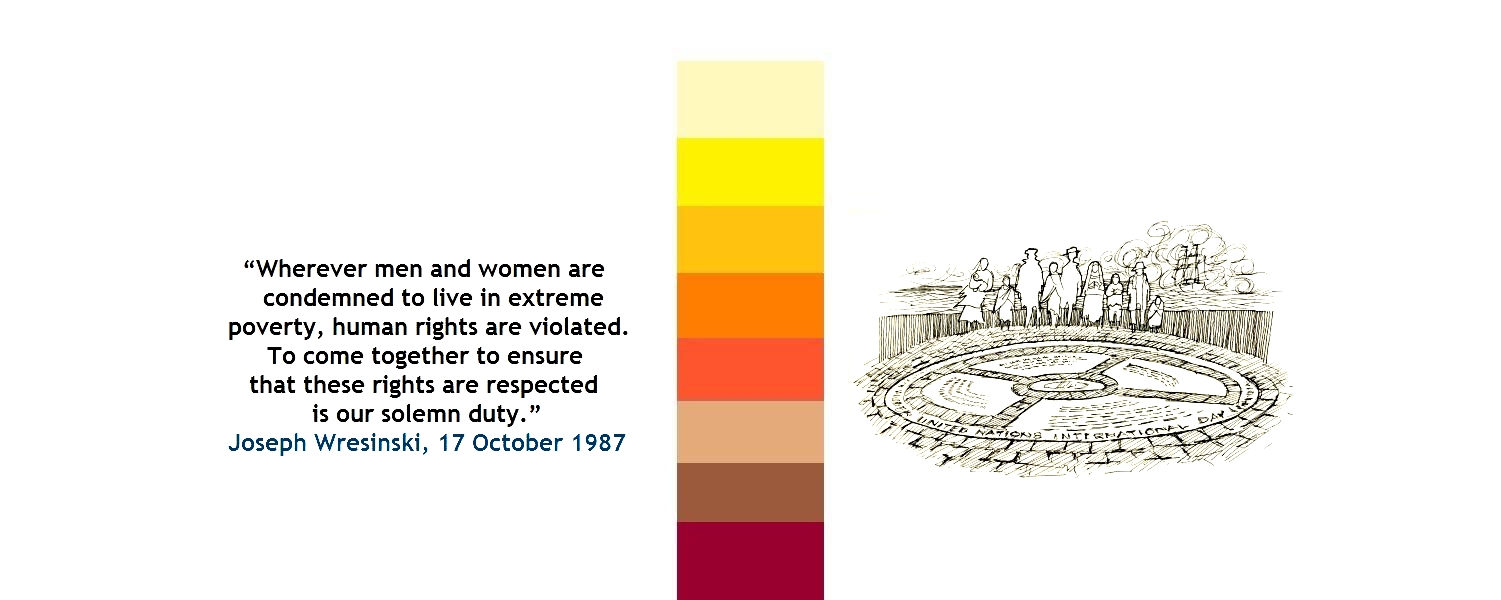Discover the UN Day 2015 International Concept Note prepared by the International 17 October Committee!
PDF Version here
Building a sustainable future requires us to intensify our efforts towards eradicating extreme poverty and discrimination, and ensuring that everyone can fully exercise their human rights. The full participation of people living in poverty, particularly in the decisions that affect their lives and communities, must be at the centre of policies and strategies to build a sustainable future. In this way, we can guarantee that our planet and our societies can fulfil the needs and aspirations of everyone – not only those of a privileged few – for this and future generations.
This year, the International Day for the Eradication of Poverty holds particular significance because it will be the first observance following the formal adoption of the Sustainable Development Goals by the General Assembly of the United Nations. Within this new development framework, designed to replace and carry forward the aims of the Millennium Development Goals, all countries committed to “ending poverty in all its forms and dimensions.”
Therefore, it is appropriate that the theme — chosen by the United Nations, in consultation with people living in poverty and civil society organizations — recognizes that all people must come together to end poverty and discrimination in order to build a sustainable future in which the needs of the present are met without compromising the ability of future generations to meet their own needs.
Current patterns of production and consumption, for example, are neither meeting the current needs of millions of people who live in extreme poverty nor sustainable. A sustainable future requires social change that respects and protects human rights, cultural diversity and the environment, reduces economic inequalities and achieves social inclusion everywhere. It requires economic growth and development that does not plunder and destroy our natural resources or undervalue labour, but actively protects our environment and supports workers’ rights.
The success of this transition towards a greener and fairer economy goes beyond mere reliance on better technology and more investment. Our increasing economic, social and environmental interdependence requires that we must also build sustainable and mutually respectful relationships between and among individuals, communities and nations, and better share knowledge at all levels.
The economic and social policies, strategies and priorities adopted during the last decades that have contributed to environmental degradation, unsustainable growth, unparalleled inequalities and social injustice must be changed or abandoned. We must distinguish between activities that should be nurtured because they meet the basic needs of all citizens and are sustainable, and those activities that must be discouraged because they only meet gratuitous needs or are not sustainable. In particular, Governments must ensure that those in extreme poverty are no longer compelled to work at the lowest wages and/or in the most difficult conditions, where there is neither job security nor social protection.
We must learn from the painful lessons of the recent global financial and economic crisis, following which stimulus policies that supported social protection and the livelihoods of the most vulnerable were replaced by austerity measures which shifted the burden of adjustment to ordinary people, especially those living in poverty or at its margins. Although Governments rushed to rescue financial institutions, which had largely caused the onset of the crisis, they also drastically curbed public spending, which caused most harm to people living in poverty.
It must be recognized that people who are socially, economically, culturally or otherwise marginalized or discriminated against are vulnerable not only to the impacts of climate change and environmental degradation, but to harm caused by policy action to adapt to or mitigate such impacts. Policies that raise food prices, for example, will disproportionately disadvantage people living in poverty. Therefore, it is crucial that actions at all levels to promote environmental sustainability adhere to the United Nations Guiding Principles on Extreme Poverty and Human Rights to ensure that they do not adversely affect ordinary people, especially those living in extreme poverty.
A sustainable world cannot exist when there is poverty, discrimination and abuse of human rights. A sustainable world leaves no one behind.
***
On 17 October each year, we are invited to demonstrate, on that day and every day of the year, the solidarity between people living in poverty and people from all walks of life, and how we are all working together to overcome extreme poverty and abuse of human rights through our individual and shared commitments and action.
Celebrated since 1987 as the World Day for Overcoming Extreme Poverty and recognized by the United Nations in 1992, the International Day for the Eradication of Poverty promotes dialogue and understanding between people living in poverty and their communities, and society at large. “It represents an opportunity to acknowledge the efforts and struggles of people living in poverty, a chance for them to make their concerns heard and a moment to recognize that poor people are in the forefront in the fight against poverty.” (United Nations, Report of the Secretary General, A/61/308, para. 58)
